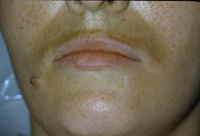
These spots may preserve the youthful looks for longer and could lower the risk of a range of age-related diseases such as heart disease or osteoporosis.
And, in some way, they offset the link between moles and an increased risk of skin cancer.
‘Dermatologists have always said that nature doesn’t give us something for no reason. If the only reason for moles was to increase the risk of melanoma, it wouldn’t be very clever,’ lead researcher, Dr. Veronique Bataille, a consultant dermatologist, said.
Bataille’s team, from King’s College London, associated moles with ageing after studying the DNA of more than 900 sets of female twins.
In particular, they focused on telomeres, the bundles of DNA that restrict the ends of chromosomes.
Considered as biological clocks, telomeres get shorter as our cells partition over time.
Previous studies have shown that those with long telomeres are likely to be biologically younger than those of the same age but with shorter telomeres.
The study, published in the journal Cancer Epidemiology Biomarkers & Prevention, demonstrated that those with more than 100 moles tended to have longer telomeres than those with fewer than 25. The difference in length equated to six or seven years of ageing.
The results showed that twins with longer telomeres seemed to keep their moles for longer and to have delayed ageing.
Dr. Bataille added that although a person is ten times more likely to develop skin cancer if they have more than 100 moles, the overall possibility of the disease is still very low.
